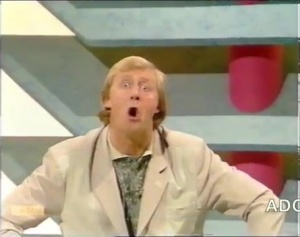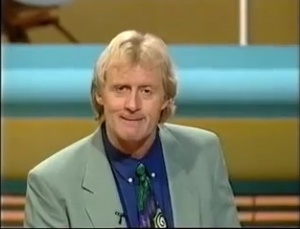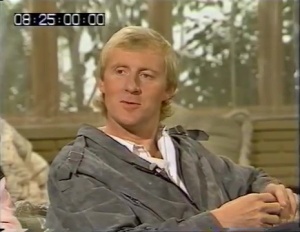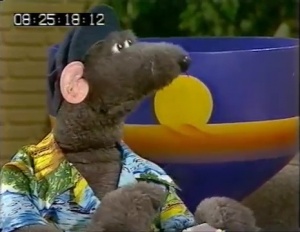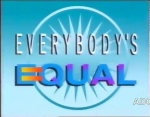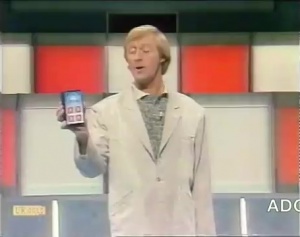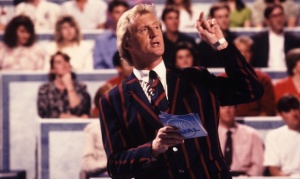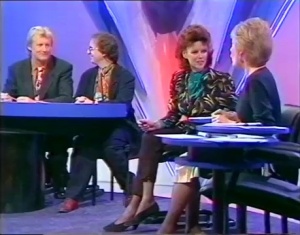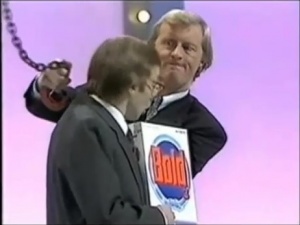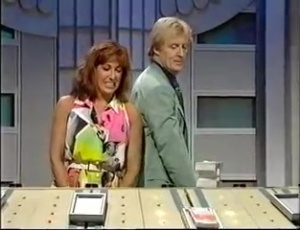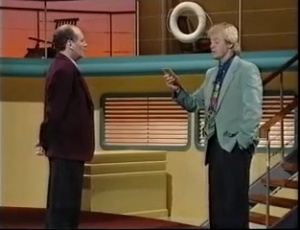Weaver's Week 2018-08-05
Last week | Weaver's Week Index | Next week
With a lull in the flow of new programmes, and the weather cooling enough that we can operate a computer for more than a few minutes, we can bring you the latest in our series of Game Show Legend profiles. Bear with us, this chap takes a bit of time to hit game shows.
Contents |
Chris Tarrant
Christopher John Tarrant was born in Reading on 10 October 1946, to Joan and Major Basil Tarrant. He went to King's School in Worcester, where he was good at hockey and cricket, got nicknamed "Cuthbert", and disliked the strict atmosphere. After reading English at Birmingham University – he'd turned down an offer from Oxford – Chris became a teacher. After splitting with his girlfriend, he lived for six months in a Mini van outside his school in Brockley.
Showbiz was Chris's aim, and he floated into the Central Office of Information's public information films. His work included the successful "Clunk-click" seatbelt campaign, and a film about the world's strongest rope. This 12-second short film won an award from the Romanian propaganda body. Wanting some fame as well, Chris sent a note to television companies with the audacious claim, "I am the face of the Seventies and this is your last chance to snap me up". ATV in Birmingham bit, and employed Chris on their daily news programme ATV Today.
It was the gateway to other jobs, such as narrating schools programme Stop Look Listen. Primary school children were shown a window on the world – how sweets were made, the basic steps of building a house. Chris was to provide a sparse narration, explaining what happened on screen and reinforcing the visuals. Unwittingly, Chris would also confuse a generation of primary school children, who heard these serious words and associated the voice with all sorts of mayhem.
Today Is Saturday (checks calendar)
At the same time, Chris was working on ATV's Saturday morning television entertainment Tiswas. In this enlightened era, ITV's companies made programmes to reflect the differences between regions; the culture of ATV in Birmingham was different from LWT in London, or Granada in Liverpool. Each of these companies made its own Saturday show, and the most popular were sold to other regions.
Tiswas was the popular programme, it became a local cult and would go national by the early 1980s. An ensemble show, Tiswas featured Sally James, Lenny Henry, Bob Carolgees and Spit the Dog, John Gorman from pop group The Scaffold, Trevor East from the sports desk, and the Phantom Flan Flinger. "Custard" pies were the stock in trade{a}, and adults would get soaked in the cage. Chris Tarrant came to dominate proceedings, taking a larger part in production. He booked comedians such as Jasper Carrott, and rock groups such as Status Quo. Other performers just dropped in, making a heady atmosphere somewhere between The Muppet Show and a rock 'n' roll collective.{b}
Most of the Tiswas cast left in spring 1981, in favour of Saturday night comedy show OTT. The late-night series was innovative, presenting alternative comedians on network ITV. Alternative comedians hadn't found their natural home on Channel 4, because that wasn't yet on air. The structure of OTT – like an old-style working men's club – was more familiar than the material.
The reaction was negative. Mary Whitehouse and her Junior Anti-Sex League found the jokes too racy. Newspaper critics found the experimental programme wasn't as good as Tiswas, perhaps forgetting that Tiswas had grown up while they weren't watching in their London mansions. Central Television's publicity had implied that OTT was the best thing since sliced bread, we were led to expect glitter to come out of the set. The first edition had a level of expectation it couldn't possibly match.
Criticised by all sides, Central dropped the show after one series, though the following year's Saturday Stayback was a refinement of OTT. We're glad they did – in an alternative universe, Tarrant stays with this late-night comedy, and might never have become a game show legend.{c}
Waking Up with a Rodent
By early 1983, Chris was sufficiently famous – or desperate, following his first divorce – that he joined the sinking ship TV-am. The breakfast franchise was a laughing stock. Apparently – and who could have predicted this! – viewers want to see David Frost and Michael Parkinson talking complex geopolitics over cornflakes. Even at the best of times, viewers didn't want this. Everyone watched the BBC's far more gentle programme, starring an attractive young newsreader and a brightly-dressed clown.{d}
TV-am was restructured, the highbrow news was dropped. Frost shuffled to Sunday, and Parky was exiled to a safe distance – the new TV-am branch in Sydney. Anne Diamond and Nick Owen discussed newspaper bingo numbers on a comfortable sofa, Diana Dors gave diet tips, and Roland Rat went out to meet the young audience. Chris Tarrant also took the show on the road, aping the Radio 1 Roadshow as he broadcast from a different seaside resort every week. It helped to attract viewers, improving from a nadir of 200,000 in May to a peak of a million by the end of summer.
Chris Tarrant was signed up by London's Capital Radio, taking their breakfast show from 1984. He'd remain with the radio station until 2004. His television work took a back seat, there was no room to combine this morning gig with a late-night weekend show, and no-one can present two breakfast shows at once. Chris would pop up from time to time on Blankety Blank or Surprise Surprise, helping us remember than a) he existed and 2) he was a very good entertainer.
On the radio, Chris developed a "zoo radio" format, with one central character and a whole host of acolytes dropping in to say their pieces. Controlled well, it sounds fresh and exciting every time; done badly, it turns into a mess. Though often offered a contract at Radio 1 around 1990, Chris never took up their offers, he preferred the absolute freedom at Capital.
The Celador Connection
By the late 1980s, Chris Tarrant had a double life. In London, he was a major star, the man who got everyone up in the morning, the cheeky chap to Terry Wogan's droll buffoonery, or the eager beavers Smith and Mayo. For the rest of us, Chris Tarrant was a fading memory, we remembered the fun of Tiswas, and recognised him from occasional telly work. We'd forgotten OTT, Chris had de-toxified himself by staying out of the national limelight.
Remember how Chris had worked with Jasper Carrott in the Tiswas days? Jasper had become a very successful comedian, and co-founded the production house Celador. Jasper was also contractually bound to the BBC. So when Celador wanted someone lively to front their shows, they thought of their old mate from Birmingham.
Everybody's Equal (1989-90)
The first fruit of Chris Tarrant and Celador's partnership was a primetime quiz, featuring no fewer than 200 people. Over the half-hour, they'd be ruthlessly cut down to ten people, and then to a single winner. All the questions were "which one of these four answers is correct", and as soon as you got one wrong, you were out of the game.
Each episode started gently, Chris would welcome some of the groups in his usual sarcastic style. He'd introduce "Four to Follow" – some of the more telegenic characters in the audience, who we'd talk to here and again when they're eliminated. The questions also started simply, with only one or two people getting the opening ones wrong. It's fodder for Chris, his schtick has always been to mock the mediocre and ridicule the rubbish. And, let's be honest, he was speaking for us at home, surely everyone knows that one.
As the game progressed, the questions got harder. Late in part one, there would be a really difficult question, where many people would have to guess. We'd go from 170 contestants to 50 in no time at all, a brutal cull that would usually end the Four to Follow segment. The last question was a timed one, the first ten to give a correct answer came back after the break.
Throughout the game, Chris would keep up a fast-talking monologue. "Italian Chinese Indian or French. One of those would serve you fried seaweed. Italian Chinese Indian or French. Three more seconds, make a guess, time's up." Attention was always on the host, he would shine a spotlight on to contestants, and perhaps make running jokes amongst the finalists.
Ten made it to the studio floor, where they could play for cash. Four questions, at £50 per answer (now worth about £200), but a single wrong answer will still take you out of the game. As soon as there's one player left – or the fastest to get the last question right – they win £1000. Their bonus round is to put four things in order for another £1000 – fail and the money gets split amongst the audience, who all answered the same question on their keypads.
Everybody's Equal was a strong format, it came back some years later on Channel 5 as Whittle, and it's pretty much the idea behind modern app quizzes like Genius and Quiz HQ. The quiz requires a strong host, as most contestants will remain faces in the crowd. Chris Tarrant was the right host, he could command the stage and brought the required element of zany to the show.
Crazy Comparisons (1991-3)
Chris remained with Celador for this daytime programme, which we think was based on the party game PSI.{e} The objective was to give clues to famous people by comparing them to other objects. So, for instance, if you're thinking of the Queen, and asked "which river is this person most like?", you'll answer "The Thames, or possibly the Dee in Scotland." From this, we'd get the hint to think about someone who lived both near the Thames (say, in Windsor), and near the Dee (Balmoral, for instance).
Over the course of the show, Chris and each of the star guests would describe one famous person, with points if the teams were able to deduce who was being talked about. One of the people being discussed was in the studio, perhaps to record an episode themselves for later in the series. This surprise guest would try to predict how the other players might describe themselves.
Crazy Comparisons was a talk programme amongst a celebrity panel, there's very little action and no prizes. The comparisons tended to be slightly surreal, "what type of fish am I?", and that played into Chris Tarrant's sense of comedy – build from what we know into the theatre of the absurd. Mostly, though, he contributed some spark into the show – in the hands of laidback Saturday Superstore host Mike Read, this show would have been deathly dull. Chris had enough energy to keep the wheels moving.
Compare and contrast with Cluedo, a primetime whodunnit loosely based on the board game. Chris Tarrant hosted two series, featuring celebrity armchair detectives passing judgement on filmed scenes and real interrogations of actors. Chris had to play this series entirely straight, asking Frank Bough and Gaby Roslin why they thought it was Professor Plum, in the drawing room, with the kettle flex. It was no fun for him, and he's since said that he hated making the show.
More to his taste was Tarrant on TV, a series of clips of absurd television from around the world. Not a new idea, Clive James had been doing something similar for about ten years, and there's a debt to Dennis Norden's error show It'll Be Alright on the Night. As we've noted, Chris was at home in the absurd, and this format let him develop surreal ideas while commentating on serious programmes. Tarrant on TV introduced many ideas to the ITV viewer, this column remembers the feats of Endurance, and the loud baiting of The Jerry Springer Show. Tarrant on TV ran for twelve years, an aeon in television terms.
The Main Event had a slightly shorter run, namely thirteen Saturday evenings from May to July 1993. Based on an Australian programme, the gimmick was that families played from their own homes, and had celebrities playing for them in the studio. The UKGS hive mind doesn't remember much about this mixture of quizzes and games, other than a scavenger hunt around the family's house, and celebrities miming "The Death of Groucho Marx". The hive mind of Operation Youtoob doesn't remember this programme at all, other than a clip of the Channel 7 original.
By now, Chris Tarrant was a minor media industry in his own right. Radio Academy Personality of the Year 1990, a column in the Sunday Mirror, adverts for a washing powder, doorstepping hospitals to find the first baby born on Carlton TV, and a trivia quiz video launched into Christmas 93. He did The Secret Video Show for KYTV, full of home video disasters. He did breakfast shows in London and New York on the same day, thanks to Concorde. And he set up a business selling high-quality suits at low prices.
Lose a Million
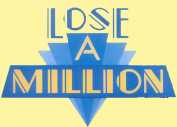
Chris Tarrant hosted a game entertainment for Wednesday evenings. A product of Action Time and Carlton, Lose a Million had a very simple premise – get every question wrong. Three rounds, starting with one where players gave freestyle answers to Chris's questions. Then the one where they're answering the question before last, for comic effect.
After the break, a "this or that" round, where players used skill and judgement to answer some difficult questions between two options. The winner played the cash game: six options, only one is a correct answer to the question, avoid it and win £5000. This last round was styled using bundles of fake banknotes, and may have subtly influenced The Million Pound Drop.
Lose a Million was played at a cracking pace, something happened every single moment. Goodness, the show had so much energy that Chris and the players actually ran to their spots, none of this walking nonsense. We loved the show's art deco styling, and the subtle motif that it was filmed aboard a luxury ship.
But the show was panned by critics, and we think unfairly. The scores were awkward: players were given five items that added to a million quid, and were to ditch (or donate) some of them based on performance. The format meant the last player would almost always win if they gave a correct answer, – we don't have a problem with that, not when the questions are difficult but not impossible to work out.
Much of the criticism served the critics' existing agenda – it's from Carlton, and Carlton were seen as the media villains of 1993, so Lose a Million had to be slagged off. No-one could find an objection to Chris Tarrant, he used his usual style – catchphrases for the audience to finish, little asides showing he was aware how silly this enterprise was, and appearing to head-butt the camera from time to time.
But the damage was done, and the show wasn't renewed. Chris Tarrant had lost Lose a Million.
And we're going to pause the narrative here, for reasons that will become obvious. The story of Chris Tarrant continues next week.
This Week and Next
Den Again Gavin Duffy will again seek nomination as President of Ireland. Duffy, a star of Dragons' Den on RTE, was defeated by Michael Higgins in the 2011 election. And there's never been a problem with television businessmen going into politics, has there?
We're on standby for the Strictly Come Dancing Klaxon. Over the next few weeks, the Beeb will announce the next set of people who will prance for our entertainment. Whose career needs a lift? Which celebrities can commit to an autumn of hard work? We're guessing at comedian Harry Hill, actor Shannon Flynn, cyclist Chris Hoy, pop star Dido, and the previously-famous David Cameron. All, some, or fewer (and probably none) of these will be announced over the next month.
BARB ratings in the week to 22 July.
- Mark Pougatch has left the Kremlin. Coronation Street returns to the top of the telly charts (ITV, Mon, 7.95m). Love Island remains the top game (ITV2, Tue, 4m).
- BBC The Voice Kids ran Love Island very close – peak was on Monday (ITV, 3.75m), and 3.7m enjoyed Saturday's live final. Pointless Celebrities (BBC1, Sat, 2.9m) just beat The Chase (ITV, Mon, 2.85m).
- University Challenge returned (BBC2, Mon, 2.1m). Catsdown remains popular (C4, Fri, 1.3m), and Blind Date (C5, Sat, 1.1m) beat The Crystal Maze (C4, Fri, 910,000).
- On the digital tier, Dave did well on Wednesday. Mock the Week (300,000), Would I Lie to You (260,000) and QI XL (255,000) take the podium positions.
More sport this week, BBC2 is mostly taken up with the European Championships in Most Sports. We do get new series on Radio 4, Counterpoint and Just a Minute both start on Monday. It's the final of Y Talwrn (R Cymru, Sun).
Footnotes
{a} Shaving foam on a paper plate, left for half an hour to reduce the soap sting, and thrown into someone's face. Doesn't hurt, other than to pride. No actual custard is involved.Back!
{b} Tiswas is a cultural touchstone, one of the most important shows ITV has ever made. But it's not a game show and hence is strictly beyond this column's remit. Many websites do the nostalgia better than us.Back!
{c} Fans of Ant and Dec will recognise this career path – a Saturday show that improved as it went on, didn't quite work when first transferred to prime time, and went a bit better second time out.Back!
{d} And you could watch The Test Card on BBC2; BBC1 had Breakfast Time with Selina Scott and Russell Grant fulfilling similar roles.Back!
{e} Indeed, earlier series were called PSI.Back!
Photo credits: Celador, Action Time, TV-am, Procter and Gamble.
To have Weaver's Week emailed to you on publication day, receive our exclusive TV roundup of the game shows in the week ahead, and chat to other ukgameshows.com readers, sign up to our Yahoo! Group.

